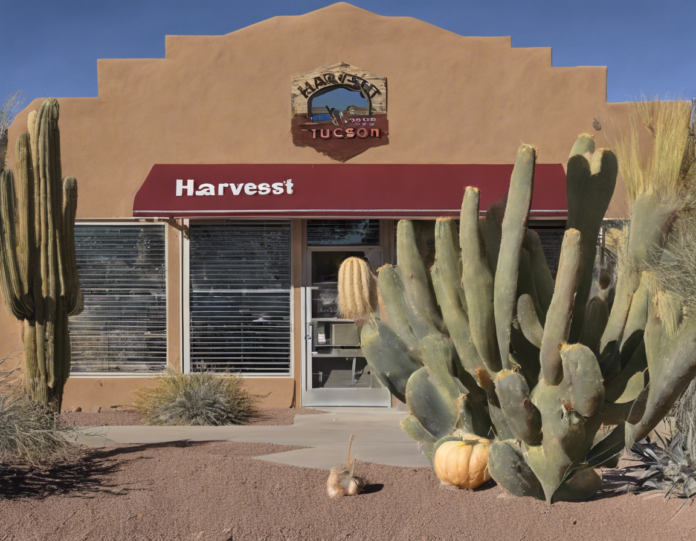Tucson, Arizona, known for its stunning desert landscapes and vibrant cultural scene, is also a hub of agricultural richness. With a diverse range of crops and produce grown in the region, Tucson boasts a bountiful harvest that is not only a delight for the taste buds but also a reflection of the community's commitment to sustainable and locally sourced food. In this article, we will delve into Tucson's agricultural offerings, from its signature crops to its bustling farmers' markets, and explore how the city's food scene is deeply intertwined with its natural surroundings.
Harvesting Heritage: Tucson's Signature Crops
Tucson's agricultural history dates back centuries, with heritage crops playing a pivotal role in shaping the region's culinary identity. One such iconic crop is the Saguaro cactus fruit, harvested from the majestic Saguaro cactus that dots the desert landscape. The sweet and tangy flavor of this fruit is not only a local delicacy but also holds cultural significance for the indigenous Tohono O'odham people, who have been harvesting it for generations.
Another crop that thrives in Tucson's arid climate is the Chiltepin pepper, a small but fiery chili that is native to the region. Known as the "Mother of all peppers," the Chiltepin is a staple in traditional Sonoran cuisine, adding a spicy kick to salsas, sauces, and marinades.
Farmers' Markets and Local Produce
Tucson's commitment to sustainable agriculture is reflected in its vibrant farmers' markets, where local producers showcase an array of freshly harvested fruits, vegetables, and artisanal products. The Heirloom Farmers Markets, held at multiple locations throughout the city, offer a glimpse into the region's agricultural diversity, with vendors selling everything from organic heirloom tomatoes to handcrafted cheeses.
Visiting these farmers' markets not only provides an opportunity to sample the freshest local produce but also allows residents and visitors to connect with the farmers and artisans who are at the heart of Tucson's food community. The Tucson Farmers Market at Rillito Park, for example, is a beloved weekend destination where patrons can shop for organic fruits and vegetables, enjoy live music, and savor freshly prepared meals from food trucks and vendors.
Farm-to-Table Dining: A Culinary Experience
Tucson's culinary scene embraces the concept of farm-to-table dining, with many restaurants sourcing their ingredients directly from local farmers and producers. This commitment to sustainability and freshness is evident in the menus of acclaimed eateries such as Downtown Kitchen + Cocktails, where Chef Janos Wilder showcases the best of Tucson's seasonal bounty in creative and innovative dishes.
From mesquite-grilled vegetables to prickly pear-infused desserts, Tucson's chefs are constantly pushing the boundaries of Southwestern cuisine, incorporating traditional ingredients in unexpected and delicious ways. The city's culinary landscape is a testament to the rich agricultural heritage of the region, with flavors that celebrate the land and the community that nurtures it.
Preserving the Harvest: From Jams to Pickles
As the bounty of Tucson's harvest reaches its peak, many residents and food enthusiasts turn to the art of preserving to extend the life of seasonal produce. Canning, pickling, and jam-making workshops are popular activities in the community, offering participants the chance to learn traditional preservation techniques and savor the flavors of summer throughout the year.
Mesquite flour, made from the pods of the native Mesquite tree, is a versatile ingredient that is used in baking, cooking, and even brewing. Its sweet and nutty flavor adds depth to desserts and savory dishes, making it a prized pantry staple for many Tucsonans.
Harvest Festivals and Community Celebrations
Throughout the year, Tucson hosts a variety of harvest festivals and agricultural celebrations that showcase the region's rich culinary heritage. The Baja Arizona Sustainable Agriculture's annual Farm Festival, for example, brings together farmers, chefs, and food enthusiasts for a day of tastings, workshops, and farm tours, highlighting the importance of sustainable agriculture in the community.
Additionally, events such as the Savor Southern Arizona Food and Wine Festival and the Tucson 23 Sonoran Hot Dog Challenge celebrate the flavors and culinary traditions of the region, inviting attendees to explore the diverse and vibrant food scene that Tucson has to offer.
FAQs: Exploring Tucson's Harvest
Q: What are some of the best times of the year to visit Tucson's farmers' markets?
A: The farmers' markets in Tucson are thriving year-round, but the fall and spring seasons are particularly vibrant, with a wide variety of fruits, vegetables, and artisanal products available.
Q: Are there any guided tours or farm visits available for those interested in learning more about Tucson's agricultural heritage?
A: Yes, several local organizations offer guided tours of farms and agricultural sites in the Tucson area, providing visitors with the opportunity to meet farmers, sample produce, and learn about sustainable farming practices.
Q: What are some traditional dishes or recipes that highlight Tucson's signature crops?
A: Traditional Sonoran dishes such as Chiltepin salsa, Saguaro fruit jam, and Mesquite flour tortillas are just a few examples of the culinary delights that showcase Tucson's unique crops.
Q: How can visitors support local farmers and producers during their stay in Tucson?
A: By shopping at farmers' markets, dining at farm-to-table restaurants, and purchasing locally made products, visitors can directly support the livelihoods of Tucson's farmers and producers.
Q: Are there any community events or festivals that focus specifically on Tucson's agricultural heritage?
A: Yes, Tucson hosts a number of harvest festivals, farm tours, and food events throughout the year, celebrating the region's agricultural richness and culinary traditions.
As you explore the culinary landscape of Tucson, take the time to savor the flavors of the region's harvest and connect with the community that produces them. From farm-fresh produce to artisanal products, Tucson's agricultural offerings are a true reflection of the city's bountiful and diverse culinary heritage.


Recent comments